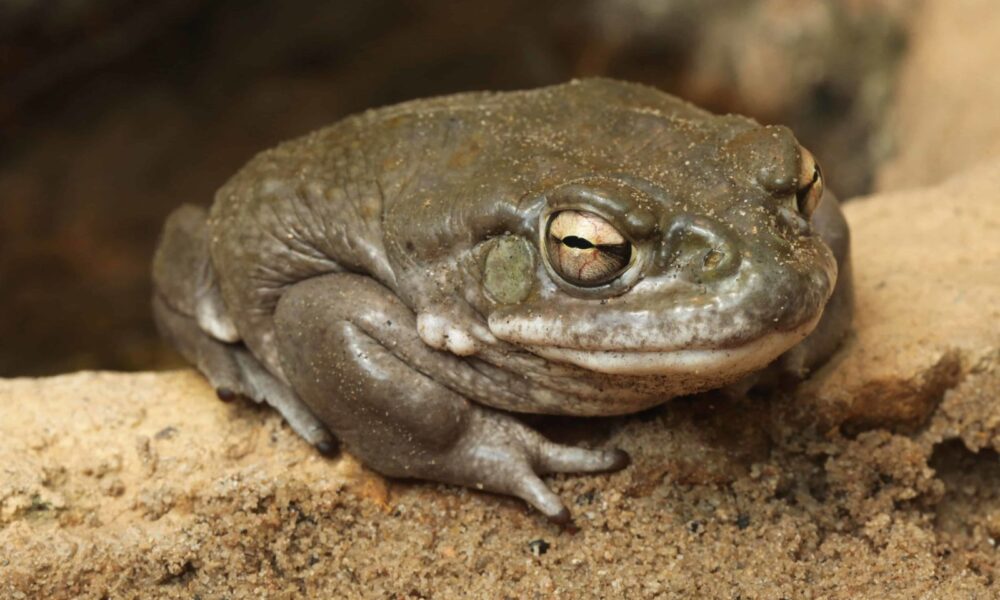Business
National Park Service Asks Visitors To Stop Licking Toads

The National Park Service is warning people not to lick the Sonoran desert toad, a species that excretes the psychedelic compound 5-MeO-DMT.
The National Park Service is asking visitors to its facilities to refrain from licking toads, cautioning them that the practice can make a person sick. The warning included a night vision photograph of a toad with glowing eyes and the declaration, “ALL GLORY TO THE HYPNOTOAD!!!,” a reference to the animated television series Futurama.
The National Park Service posted the warning on its official Twitter account last week, noting that the “Sonoran desert toad (Bufo alvarius) is one of the largest toads found in North America, measuring nearly 7 inches (18 cm).” The toad, which is also known as the Colorado river toad, has a self-defense mechanism that causes the amphibian to secrete a toxic substance when disturbed. The secretion contains the compound 5-MeO-DMT, a tryptamine-class psychedelic drug that can also be found in some species of plants.
“As we say with most things you come across in a national park, whether it be a banana slug, unfamiliar mushroom, or a large toad with glowing eyes in the dead of night, please refrain from licking,” the National Park Service wrote on Twitter.
The psychedelic 5-MeO-DMT is similar to the drugs DMT and bufotenin. All three compounds have been used as entheogens by South American indigenous cultures in spiritual ceremonies. In New Mexico, the Sonoran desert toad is considered threatened by “collectors that want to use the animal for drug use,” according to a listing by the state’s Department of Game and Fish.
The drug is collected from the toads from glands that excrete a toxic substance when they are attacked by predators or otherwise disturbed. Once dried, the substance can be snorted, smoked or vaporized to ingest the 5-MeO-DMT it contains.
Please Don’t Lick The Toads
Toad licking to get high is a common trope in pop culture. But in its post, the National Park Service warned that the toad’s secretions can be toxic.
“These toads have prominent parotoid glands that secrete a potent toxin,” the agency added to its post on Twitter. “It can make you sick if you handle the frog or get the poison in your mouth.”
The U.S. Drug Enforcement Administration (DEA) lists 5-MeO-DMT as a Schedule 1 drug that has no medical value and a high propensity for abuse. But researchers are studying the compound to determine if it can be therapeutically beneficial for people with a variety of mental health conditions including depression and anxiety. Alan K. Davis, Ph.D., a postdoctoral research fellow in the Behavioral Research Unit at the Johns Hopkins University School of Medicine, noted that 5-MeO-DMT has unique properties, including its fast action and short duration of psychedelic effects compared to other psychedelic drugs.
“Research has shown that psychedelics given alongside psychotherapy help people with depression and anxiety. However, psychedelic sessions usually require 7 – 8 hours per session because psychedelics typically have a long duration of action,” Davis said in a 2019 release from Johns Hopkins Medicine. “Because 5-MeO-DMT is short-acting and lasts approximately 30-90 minutes, it could be much easier to use as an adjunct to therapy because current therapies usually involve a 60 – 90 minute session.”
The use of 5-MeO-DMT outside the clinical setting has been popularized by public figures who have revealed their experimentation with the drug, including comedian Chelsea Handler and boxing legend and cannabis entrepreneur Mike Tyson. Hunter Biden, the son of President Joseph Biden, said last year that he used 5-MeO-DMT seven years earlier to help him treat addiction.
British scientist James Rucker, a psychiatrist at King’s College London, said this week that he welcomes the warning from the National Park Service, noting that there have been reports of people licking toads in Asia and elsewhere outside the United States.
“I’m sure the toads would appreciate their dignity and autonomy being preserved, too,” Rucker told The Washington Post. “The toad wants to be left alone. We should respect that.”
Source: https://hightimes.com/news/national-park-service-asks-visitors-to-stop-licking-toads/